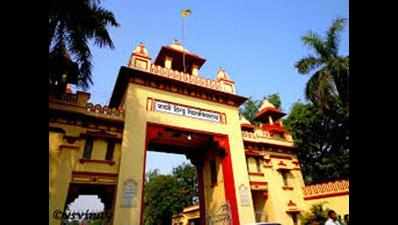- News
- City News
- varanasi News
- BHU to have own waste management system
Trending
This story is from June 27, 2016
BHU to have own waste management system
The Banaras Hindu University (BHU) is all set to have its own waste management system with the implementation of decentralised process of disposal of waste on the campus.

Banaras Hindu University.
Varanasi: The Banaras Hindu University (BHU) is all set to have its own waste management system with the implementation of decentralised process of disposal of waste on the campus. In the pilot phase, the garden waste on the campus will be treated in compost beds through mulching technique.
After the successful implementation of Solid and Liquid Resource Management (SLRM) in Vellore and Ambikapur municipality in Chhattisgarh, project director of Indian Green Service C Srinivasan of Vellore has been engaged by the administration and district administration to replicate the concept on the campus.
Talking to TOI on Sunday, BHU vice-chancellor, GC Tripathi said, "The SLRM model of C Srinivasan is impressive as it talks about the collection, segregation as well as management of waste. With implementation of the concept, the BHU will be made a model in waste management for entire UP." In the initial stage, garden and dry leaves will be managed and treated through scientific methods. A 2,000 sq ft land has been furnished for the segregation purpose and composting beds are also being prepared to prepare mulch, he added.
According to the VC, the whole campus has been divided into six sectors and barricading is being done in the selected area to ward off animals. One composting bed has been readied and many more will be prepared for reducing space and treatment of garden resources, he informed.
Meanwhile, a seven-member team set out to survey about 1,400 quarters on BHU campus to fetch data of the kind of solid and liquid waste generated from households. The team was flagged off by the BHU VC on Sunday morning.
"Our aim is to make the entire campus waste-free. For this, while the garden wastes are being treated, simultaneously measures can be initiated to treat waste generated from houses, hostels and canteens on the campus. Hence, a two-day survey will be conducted and a proposal be submitted to the university administration. If approved, the concept will be implemented making it waste-free, Srinivasan added.
After the successful implementation of Solid and Liquid Resource Management (SLRM) in Vellore and Ambikapur municipality in Chhattisgarh, project director of Indian Green Service C Srinivasan of Vellore has been engaged by the administration and district administration to replicate the concept on the campus.
Talking to TOI on Sunday, BHU vice-chancellor, GC Tripathi said, "The SLRM model of C Srinivasan is impressive as it talks about the collection, segregation as well as management of waste. With implementation of the concept, the BHU will be made a model in waste management for entire UP." In the initial stage, garden and dry leaves will be managed and treated through scientific methods. A 2,000 sq ft land has been furnished for the segregation purpose and composting beds are also being prepared to prepare mulch, he added.
According to the VC, the whole campus has been divided into six sectors and barricading is being done in the selected area to ward off animals. One composting bed has been readied and many more will be prepared for reducing space and treatment of garden resources, he informed.
Srinivasan, who conceived the concept, said, "After studying the BHU campus for a couple of days, we concluded that about 70% of waste generated on the campus comprises garden waste followed by residential waste and medical waste from hospital. The dry and wet garden waste can easily be treated using scientific methods and mulching is one of the techniques. For this, composting beds are created and mulch is prepared from the collected load of dry leaves. One composting bed will be created every two days to treat the garden wastes of the campus."
Meanwhile, a seven-member team set out to survey about 1,400 quarters on BHU campus to fetch data of the kind of solid and liquid waste generated from households. The team was flagged off by the BHU VC on Sunday morning.
"Our aim is to make the entire campus waste-free. For this, while the garden wastes are being treated, simultaneously measures can be initiated to treat waste generated from houses, hostels and canteens on the campus. Hence, a two-day survey will be conducted and a proposal be submitted to the university administration. If approved, the concept will be implemented making it waste-free, Srinivasan added.
End of Article
FOLLOW US ON SOCIAL MEDIA










